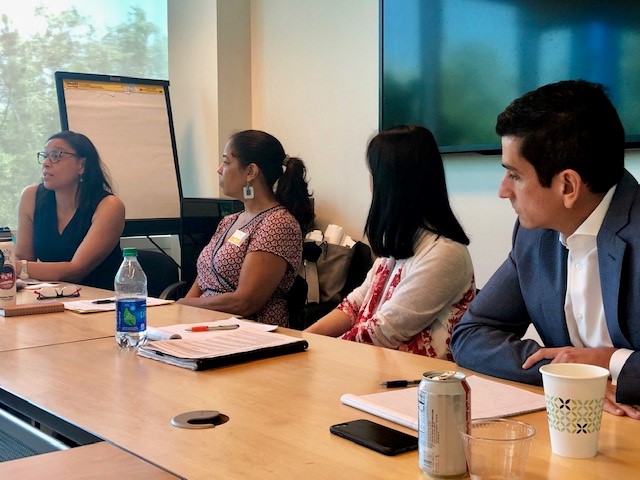
Community Partners Board Chair Ange-Marie Hancock Alfaro moderates panelists Regina Freer, professor and chair of the Politics Department at Occidental College; Dora Leong Gallo, president & CEO, A Community of Friends; and Community Partners board member Victor De la Cruz, partner, Manatt, Phelps, Phillips, LLP.
It’s doubtful that few Angelenos were surprised when the results of the recent Greater Los Angeles Homeless Count revealed that the number of people living on the streets in one of the most prosperous cities in the country had grown. But that the increase was a full 16 percent up from last year, bringing the region’s total number of people living unhoused to 60,000 was a stunning revelation that prompted some powerful indictments of city leaders.
Here at Community Partners our board members, along with staff, recently heard from a panel of experts on the issues contributing to the housing crisis here in Los Angeles. Regina Freer, professor and chair of the Politics Department at Occidental College; Dora Leong Gallo, president & CEO, A Community of Friends; and Community Partners board member Victor De la Cruz, partner, Manatt, Phelps, Phillips, LLP explored the many complex and contradicting forces contributing to today’s crisis, expertly moderated by board chair Ange-Marie Hancock Alfaro. Among those forces:
- the historic ‘redlining’ practices that placed limitations on where people of color could live
- fallout from Prop 13 that artificially holds down property taxes
- well-intentioned environmental policies that severely slow and limit development
- NIMBY-ist resistance to density and supportive housing
- displacement from gentrification
- an idealized vision of LA as a sprawling region of low-density single-family homes
While all three panelists came from differing perspectives, all three agreed the current system of housing and development in Los Angeles is wholly dysfunctional and in need of new cross-sector alliances.
The whole discussion was one small step in keeping our team informed about an increasingly dire issue, one that a handful of Community Partners projects and initiatives are currently addressing with a variety of different approaches. Through our work as a civic intermediary, Community Partners is working with LAHSA (the Los Angeles Housing Services Authority) to provide capacity building training to some of its grantees, strengthening their ability to expand and take on new contracts and larger grants made available through the passage of Measure HHH. Another seven projects addressing issues related to homelessness operate under our fiscal sponsorship program, including:
Hospice for Individuals Experiencing Homelessness
Project leaders are working to bridge a specific gap in the homeless healthcare safety net: meeting the needs of terminally ill individuals living unhoused. Currently in the exploratory phase, the goal will be to create a unique facility devoted to providing compassionate, quality hospice care focusing on respect, honor, and dignity. Eventually, the project leaders, who all have extensive experience in healthcare and social services, envision a scalable and adaptable model suitablefor replication statewide.
With some 16,500 people sleeping in their cars on any given night, providing opportunities for safe overnight parking has been gaining traction as one way to manage the ongoing housing crisis. Safe Parking LA is still expanding, but currently manages seven sites at partnering lots across the city, providing safe, legal parking for 80 vehicles and approximately 95 individuals every night. The project ensures security guards and restroom access and offers access to social service resources.
What started in 2011 as an all-volunteer effort to provide food and clothing to homeless youth in Venice, has since blossomed into a multi-service organization serving hundreds of young people with compassion and care from their own building in the beachside community. Last year alone, SPY’s staff counted 11,157 visits to their drop-in center, and their growth continues.
College students, facing the ever-rising costs of tuition and books, are experiencing food and housing insecurity as well as homelessness at record numbers. Which is why a group of students at UCLA launched Students for Students, an effort to meet the basic needs of homeless college students from all area schools. In addition to assistance with food and shelter, the student-run project also connects peers to resources to finalize post-shelter housing plans and a path to graduation.
The coalition, one of Community Partners’ longest standing projects, is comprised of public agencies and faith communities committed to working collaboratively on issues of housing, hunger and health through service coordination, public education and advocacy. Their work as a convener and facilitator of leaders from some 55 different member organizations is critical to regional efforts to alleviate homelessness.
This all-volunteer group regularly collects donations of bedding, furniture, clothing, toys, groceries and toiletries – and then sets about creating a warm, welcoming new home for families transitioning out of homelessness. With Community Partners since 2008, the project partners with Venice Community Housing and Westwood Transitional Village to connect with veterans, domestic violence survivors, and families entering transitional housing programs.
Urban Possibilities goes beyond the basic needs of food and shelter, offering a program of art, inspiration and empowerment to individuals experiencing homelessness. Their 12-week immersion in empowerment principles, writing and performance helps inner-city adults, living through life’s toughest trials, gain tools needed to achieve, land jobs and find self-acceptance. Each class ends in a public performance, published volume of work and a new vision of what’s possible.

